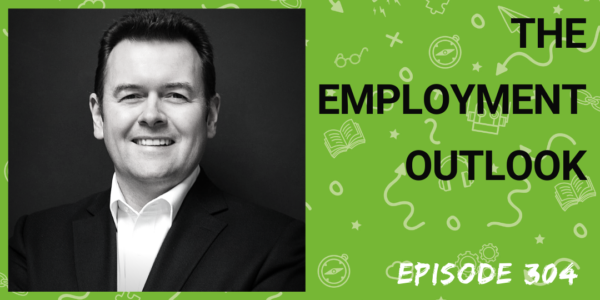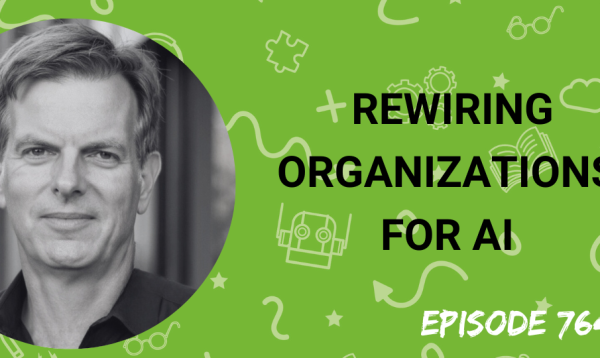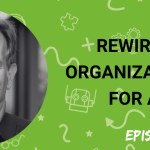With many countries facing a second wave of COVID 19, taking a long term view on the outlook for work and employment is difficult. However, several months into this global crisis, crucial labour market trends are emerging, which will shape the future of talent acquisition.
My guest this week is Neil Carberry, CEO of The Recruitment & Employment Confederation. The REC is doing a vast amount of work to understand the changes in the labour market and advise talent acquisition leaders and recruiting firms on the likely future. In our conversation, Neil shares some valuable perspectives on the challenges that lie ahead.
In the interview, we discuss:
• The current state of global labour markets
• Hiring hotspots where the jobs market is recovering
• The long term impact of the pandemic on the shape of employment
• Creating career pathways into in-demand jobs
• The recruiting implications of a mixed model of remote working
• The role of recruiters in rebuilding economies
• How has the increase in tech adoption affected talent acquisition in the long term
• Similarities and differences in global markets
• What should talent acquisition be focusing on for the next six months
Subscribe to this podcast in Apple Podcasts
Transcription:
Matt Alder [00:00:00]:
Support for this podcast is provided by Paradox, the conversational AI company helping global talent acquisition teams at Unilever, McDonald’s and CVS Health get recruiting work done faster. Let’s face it, talent acquisition is full of boring administrative tasks that drag the hiring process down and create frustrating experiences for everyone. Paradox’s AI assistant Olivia is shaking up that paradigm, automating things like applicant screening, interview scheduling and candidate Q and A so recruiters can spend more time with people, not software. Curious how Olivia can work for your team? Then visit Paradox AI to learn more.
Matt Alder [00:01:04]:
Hi everyone, this is Matt Alder. Welcome to episode 304 of the Recruiting Future podcast. With many countries facing a second wave of COVID 19, taking a long term view on the outlook for work and employment is difficult. However, several months into this global crisis, crucial labour market trends are emerging which will shape the future of talent acquisition. My guest this week is Neil Carberry, CEO of the Recruitment and Employment Confederation. The REC is doing a vast amount of work to understand the changes in the labour market and advise talent acquisition leaders and recruiting firms on the likely future. In our conversation, Neil shares some valuable perspectives on the challenges that lie ahead.
Matt Alder [00:01:57]:
Hi Neil and welcome to the podcast.
Neil Carberry [00:01:59]:
Well, a real delight to be with you.
Matt Alder [00:02:01]:
An absolute pleasure to have you on the show. Could you just introduce yourself and tell everyone what you do?
Neil Carberry [00:02:08]:
So I’m Neil Carberry. I’m the chief executive of a body called the Recruitment and employment confederation. The REC is the UK’s representative body and professional body for recruiters and that’s several thousand recruitment agencies, but also about 10,000 recruitment professionals both in agency and in talent acquisition inside companies. But as a sideline, I do a little bit of work with ECAs and with the LawPay Commission helping make British labour market policy.
Matt Alder [00:02:42]:
Now I know that in your role and something that the REC does a lot of is obviously monitoring the labour market and looking at what’s going on. It’s a pretty crazy year all around the world in terms of growing unemployment and shifts in the economy. I suppose to start on a positive note, what are you seeing in terms of recovery in the jobs market? Where are the hiring hotspots? What’s going on?
Neil Carberry [00:03:07]:
So I think if you look across the labour market in the UK and I think my opposite numbers in federations around the rest of the world would say the same thing is Covid is a very differential sort of recession. From what we’re used to, if you go back to the 70s and the 80s, the jobs impact were primarily in manufacturing in the Midlands, north and Scotland. In the UK, if you go back to 0809, it was mostly professional services and financial services and centered in London and the southeast. And actually I remember I was a different business organization at that time and I remember how normal business in the north felt at that time because it was less affected by the recession. The interesting thing about COVID is it’s really a demand driven recession in as much as everyone stopped very swiftly at the beginning of the lockdown and in particular those businesses facing the consumer were hardest hit. So really tough times in terms of hiring in hospitality, in retail. I think it’s also in office work because offices are the, the kinds of places that are more likely still to be operating remotely and closed. And some of the recruitment, while we’ve made some really good progress in terms of online, has slowed into those places. The places that are going really fast are what anything that’s affected as a driver of demand from the, from the, from the COVID situation. So anything in healthcare, anything in logistics that’s been driven by the big move to online retail. But also actually factories by and large are open and we’re seeing big demand in engineering but also in other areas that we know will continue to be big. So it is huge as well. It’s really a sectoral story though, rather than a regional story. So previous recessions have been regionally quite differentiated I think because this one particularly hits hospitality and retail and they are everywhere. It falls more evenly apart from one thing. It’s definitely true now that smaller towns, regional cities are doing better than larger cities because more people are going back. So if you look at businesses across the uk, they’re typically reporting better returns from sites in county towns than they are from sites and city centres. And I think that will drive a bit of change in hiring as well.
Matt Alder [00:05:50]:
That’s really interesting because I live in a small commuter town just outside Edinburgh and the town is full at the moment because people aren’t commuting and aren’t going into the city. So the shops are busy and the demand is there. So it’s a really interesting dynamic. What do you see from this in the long term? Because you mentioned that this is a demand led recession now presumably restaurants and retail will, will start up again. Probably not in the short term, but in the, in the medium to long term in some way shape or form. What do you think some of the, the longer term Impacts of this are likely to be in terms of employment and the shape of employment.
Neil Carberry [00:06:31]:
So I’m really quite dismissive of the kind of argument that the stock of employment is likely to be lower over time. I think we’re constantly told this and it never seems to be true because, you know, as human beings we find new ways to serve each other and new job and create new jobs. I think the, I think the challenge is less about the stock and it’s more about transition. So the first big challenge is that there are some sectors that are going to be larger coming out of this and some areas which, which will be growing and some areas which will shrink. I think we all know that the very large numbers of people who’ve worked in bricks and mortar retail up to now, will there be fewer people working in bricks and mortar retail for the long haul? So there’s a real challenge in transition and understanding where the growth is. And if I talk to my recruitment agency members, we’re talking a lot now about not having discussions about kind of short term talent acquisition, but actually getting the discussion onto where’s this business going? Which bits are growing, which bits with regret are going to be smaller or sold off. How do we begin to build a plan for getting the people into those roles that need to be into those roles? Because even today, even this week, I have been talking to recruitment agency businesses who cannot fill their vacancies because the kind of slightly simplistic politician world of all unemployment automatically clears into all extant vacancies. We know that’s not true because people need to make transitions. So there’s a big bit about how do we help people make that transition. Obviously there’s a government role in that, but I think as important employers, we also need to think about, well, how do our pathways need to change to help people who are coming maybe into our business mid career or help people on a pathway into a new and growing area that maybe we haven’t built up an apprenticeship or a skills pathway before. So there’s a big pressure on businesses to think about that. And then just in terms of the position of candidates and businesses, we know that this kind of mixed model for lots of places where people don’t necessarily have to be on site all the time is going to stick around. I mean, you talk about your commuter town, I live in one as well, just outside Oxford. Although I am an Edinburgh boy by background and I recognize exactly the same thing. You know, the most notable thing when you walk around town is that there are prime age men and women in the town where I live now in the middle of the day, where there wouldn’t have been previously because we would have been in Reading or Oxford or London or Bristol or all the places that, that, that people work. And I don’t think people will go back to five days a week in, in one place they are going to move, make a move to some kind of mixed model. And that mixed model poses lots of really interesting questions for talent acquisition. You know, if you think about hiring in London, if you’re only requiring someone to come to the office two or three days a week, your commutable range realistically stretches from Plymouth in Devon on the Cornish border to Newcastle upon Tyne. And then that has some loads of knock on impacts on things like pay and what pay expectations are for people who are working in wild, working from wildly different home bases. And we will get a lot more individualization of the discussion about how we work. And for businesses, I think that individualization you need to have some kind of framework within which that happens. So I did a, an event just last night talking about the fact that there’s also a new collectivism here about how do we employ as an organization and how do we. And what’s our employer brand that you have to get spot on for? What is a very different kind of ask and proposition for candidates?
Matt Alder [00:11:00]:
Absolutely. I think this is requiring a rethink by employers that no other recession has really driven before. A couple of points I sort of want to pick up on there. Obviously you mentioned skills and companies having the right skills and training people and rethinking career pathways and all of those things. And that’s something that I know is impacting employers all over the world. Are you starting to see any interesting or innovative solutions to that problem coming from employers themselves or from recruiters?
Neil Carberry [00:11:32]:
So I’m a great believer in the idea that recessions don’t do anything economically other than amplify and accelerate things that were already happening. And the thing that gives me most hope, and it was interesting to see Boris Johnson pick up on this a bit on 29 September, is that in areas of England, particularly because some of the work that say Andy Street’s done in Birmingham, you’re starting to see a big trend towards more local discussion about what how you match supply and demand for skills. So you’re getting colleges and education providers and small businesses, large businesses, local enterprise partnerships together and really starting to plan around if this is the demand that we see in the local area for the things that are growing now, how do we build at local level, real plans. So kids from around here can get access to that and adults from around here can get access to that in sustainable ways. And one of the most powerful things we could do to drive that, of course, is allow firms to share skills funding. In the UK we’ve got an apprenticeship levy which, you know, we at the RC been coming for years to reform and making it shareable is one way that you can reform it. So I think that’s going to be really interesting because the risk traditionally with transition is that we all leave it to government. And government designs some kind of massive top down scheme that is a success in its own terms because loads of people use it, but is a failure in absolute terms because you don’t deal with the core challenge which is getting people into sustainable work. So our criticism of Rishi Sunak, the UK Chancellor’s winter economic plan, was nothing to do with the content of the plan. I think it’s actually all quite sensible stuff and things like the VAT change is really, really helpful to businesses. But there needs to be more on how can we, at local and sectoral level drive discussions about the pathways people have into the jobs that are growing. And I think for businesses a big part of this is employer brand. So it’s not just. That’s how we meet our needs. And you know, chief execs say talent is their biggest issue and I usually say to chief executives, say that great. So don’t buy it like you buy paper clips. Start thinking about it in terms of human engagement and that kind of humanity that we’ve all had because we’re, we’ve been inviting each other into our homes for the last six months to do our business meetings. I think there’s a, as well as kind of enlightened self interest in terms of building paths to growing areas. I think increasingly there’ll be an expectation that business pitches in on this and ties its workforce development plan to skills and progression plans that are happening locally to them in the areas where they hire. Boost for inclusion. Obviously, I think that is a huge opportunity for recruiters and talent acquisition specialists to really play a big difference, big role in mitigating the crisis that we’re in now and helping us bounce back. We’re just starting some work at the rec about the difference doing this well can make, but not to us as recruiters or just directly to companies, but to the growth of the whole British economy and the opportunity that the British economy can deliver to British people. I know that that’s a process that’s happening Elsewhere in the world as well. Our colleagues in Australia are doing some fantastic work on the role of recruiters in really helping Australia through the crisis. And I think we should have a moment of pride and opportunity here for what is increasingly a very professional role. You know, the rec, our focus is on supporting members as a particularly individual members, on professionalism and standards and professional qualifications, because we think increasingly the role of TA and of agency recruitment and the success of economies is going to be huge.
Matt Alder [00:16:19]:
Just to pick up on another point that you made earlier, I think in the future, when we look back at this time, we’ll. We’ll kind of categorize it as a time of intense and rapid digital transformation. And it’s very obvious that some things aren’t going to go back to the way that they were because of the way that people are now using technology or things have been enabled by technology that people didn’t think were actually possible. You mentioned that your view is that we’re going to go back to some kind of blended version of office work and homework. How do you see recruiting being affected in the long term by the sort of the leaps that have been made in terms of using technology in the last few months?
Neil Carberry [00:17:03]:
That’s a really interesting question and I think from our perspective. Take your lead. From what? Don’t watch what I say, watch what I do. The REC’s recently launched a FutureLearn course for TA professionals inside companies about recruiting and onboarding online. And I think when we in FutureLearn started that, it was about how can we keep things going during this period. And I think now it’s more about how do you make sure that in recruiting and onboarding online you’re doing it well, because bits of this are going to stay. What have we learned about online work and recruitment? Well, one, you can move processes more quickly. You can slide into people’s diary for half an hour, caught much more easily because people’s diaries are much more rigidly managed. In the zoom world, you can run processes really quickly. I’ve come across one where someone went via a couple of interviews from not looking for a job, passive candidate Monday morning to a job offer Friday afternoon. That poses some really interesting and different questions, which is candidate engagement is all about making sure people feel they’re making the right decision for them and you and that you know that they are settled in it being the right call. Can you do that in four days in the way that maybe in traditional process it’s running sort of three, four weeks at least for rules of some seniority that’s an interesting question and I think what we have got now is the ability technologically to run quite swift processes online interviews. I think online use of testing and assessment will just take off from here and we’ll use it much more, much more. Even in processes where we’re using in person interviews. I think online interviewing does encourage a level of structure that’s probably helpful. So there’s a lot that we can learn. I do think that the skill in IT is going to be making sure that just because the technology enables us to go fast, we don’t necessarily need to go as fast as the technology enables us. So the art of talent attraction is talent attraction. The art of recruitment is in the human and not in the process. So I do think we. It’s going to pose some big questions about how we manage processes. But in reality, yeah, I think increasingly you might well see the in person interview come back, but I think you’ll see it at the end of the process. I think, you know, when you’re doing interviews of sort of eight to 10 candidates on a short list, I’d expect that first stage to be increasingly, increasingly to stay on zoom. It’s been fascinating for me just parochially, our board has been recruiting some new non recruiter non execs over the last month and how efficient the process has been and effective run entirely online. I think we’re learning a lot there about what the tech can do. The critical thing is that the human stuff, the added value that exists around that is still just as important. So I’m really optimistic actually that we’ve learned a lot of use during this period for recruitment. I do think that we need to remember that there’s a lot of stuff that isn’t kind of automatable or even aiable at this stage or possibly at any stage. And I think there’s a real drive, it’s a bit like office space. There might well be a real drive to say, well, we can do all this via technology Now. I’m cautious on just a tech first solution because it’s a bit like the FD who says, oh, we don’t need an office now, we’ve had the office closed for six months. Well, you know, if you. That’s great if you’re like me and sitting here in the office at home, but if you’re working on Mum’s ironing board at the start of your career, because Mum’s working on the kitchen table and Dad’s working on the only desk, if you’ve never had access to the workplace to understand the culture or access the training and support that comes about there. If you’re trying to do innovation and business planning, all of those things require a level of co working that technology doesn’t deliver particularly well. But they’re long term things. And I think the same is true of recruitment. You can run processes in very short, very quick ways online, but actually the art is in how we bring candidates and companies together and that art is a human art. So use the technology. But it has to. The technology is a tool, it’s not the process.
Matt Alder [00:22:10]:
I know that the REC is affiliated with similar organizations all over the world. What are you seeing from outside the uk? How is recruitment being impacted in other countries? Is it similar? Are there variations? What’s it, what does it look like out there?
Neil Carberry [00:22:28]:
So I think it’s fair to say that, you know, roughly speaking the impact on the market correlates with the position on the virus and controls put in place by government. So we saw China fall off the cliff first in terms of recruitment activity and then bounce back very strongly sort of in the March time while we were locking down. Similar sort of process in Australia, the United States and Canada for different reasons, where we went down very quickly and came and then came back quite quickly, a little bit of slowdown. More recently in Australia because obviously they had an outbreak in Victoria. The US has picked up, but of course the US has picked up because they’ve edged towards a living with the virus strategy that’s roughly different to what’s happening Europe. In Europe the story is again, you know, more effect in those areas with higher cases. Overall the things that I draw out are, you know, temp has been much less affected than permanent. So in the UK peak to trough, I’d say PERM recruitment activity dropped by about 80% in March and April. Now it’s come back since then. But that is a much bigger drop than the sort of 40% peak to trough in that time period that we saw in temp. And I think the draw there are big drivers still to temp in the market now. Lots of HRDs talking to HRD of JSK recently, lots of HRDs saying the challenge that they have right now is they’ve got quite good demand and quite good visibility in the business for this month and next month. The challenge is not knowing what the path is three to six months out. And I think that is, that has been a big driver to temp in the, in the UK market as it bounces back. And I, I see that story played out in Other markets globally. Clearly there, there are a number of countries where, like the uk I think Australia is in the same place number of other Western European countries where government intervention has maintained capacity in recruitment. Whether that’s people on furlough in TA roles in big businesses or it’s people accessing the support scheme in say Australia working in agency. The challenge now is how we transition from that heavy support scheme back into normality and what that means in terms of the prioritization inside companies of kind of TA roles and HR roles. And I think that we’re facing another moment where we’re going to have to make the case for people thinking being at the top table inside businesses, always difficult in a recession where, where the finance counts. But I think there is a greater pressure on businesses to think a bit more long term about their financial prospects and part of that is about getting the people stuff right. So I’d hate for this to be a crisis where we lose track of the kind of the importance of candidate experience, the importance of good work, the importance of good employee relations. And actually I think, think there’s a chance that we won’t do that because around the world what you do see is a lot more discussion around how we go forward that is genuinely rooted in some of the humanity that it is the, the theme of 2020. If you want the silver lining of all this, which is as I said earlier, you know, people being invited into each other’s homes on zoom calls that I’ve noticed a real drop in defense amongst business leaders in terms of talking about how they are and talking about how the business is doing. I think some of that we’re going to try and keep hold of it, help us navigate the future.
Matt Alder [00:26:36]:
So final question and this will probably be a summary of some of the things that you’ve already, that you’ve already said. But what would your advice be to employers, to talent acquisition teams in terms of what they should be focusing on, on and doing over the next six to 12 months.
Neil Carberry [00:26:53]:
So I think the first, you know, let’s not be Pollyanna ish about this, right? These are tough times and they’re the toughest times that most of us have worked through. But they’re not without hope or without optimism. And what is happening now in businesses around the world is business leaders are thinking about what is the shape of this business going forward, how does this business succeed for its shareholders, how does it serve customers needs as they change? I think there’s a real opportunity for people working in HRTA people roles to make A robust case that says both in terms of the court of public opinion, the fact you can kill your brand overnight on Twitter from doing the wrong thing, and in terms of the reams of data that we have on productivity and how productivity is generated, especially in services industries, most western economies are heavily services skewed. Employee relations matters, how people come into the business matters, how they’re onboarded once they’re recruited matters, and how they’re managed matters. And that shines through from loads of the productivity work that’s been done in the UK in the last few years. So I think now is really a moment to be the agents of tying those two things together. Because we’re going to have to do as companies what is commercially sensitive and some of that is going to be really difficult. But we can do it in ways which focus on that long term people engagement strategy. And that is a bit more strategic, it’s a bit more about workforce planning, it’s a bit more about innovation in the business. But if not us as a community, who is going to hold the torch for that inside businesses? Because it’s not going to be finance. And that, that strikes me as a tough fight, but one that’s worth picking, one that’s worth picking whether you’re internal or indeed whether you’re an agency. Because if you’re a recruiter in agency right now, phoning up with a bunch of CVs isn’t going to get you very far. But phoning up with some interesting ideas about an area that a client business is growing in might get you a discussion that leads you nowhere. But in time it might lead to some interesting being pulled in on replanning for the business and starting to have really exciting contributions about what we build because it’s time to get focused on what we build back. I said earlier, recessions just amplify and accelerate things that have already happened that were already going to happen in our labor market. That’s true. They also give us an opportunity to remake and reprioritize. So I think as we come out of this, the scope for innovation is enormous and the scope for that being people driven is really big as well. So I think a bit of optimism about that and a bit of pride in dealing with the line in terms of solving the line problems through better use of our people strategies. I think that ultimately this has been a really tough year. But you know, 2021, 2022, 2023 could be great times to be in this line of work as we’re building something that lasts for another economic cycle. 5, 10, 15, 20 years.
Matt Alder [00:30:40]:
Neil, thank you very much for talking to me.
Neil Carberry [00:30:42]:
Thank you Matt. Absolute pleasure.
Matt Alder [00:30:44]:
My thanks to Neil. You can subscribe to this podcast in any Apple Podcasts on Spotify or via your podcasting app of choice. Please also follow us on Instagram. You can find the show by searching for Recruiting Future. You can search through all the past episodes@www.recruitingfuture.com on that site. You can also subscribe to the mailing list to get the inside track about everything that’s coming up on the show. Thanks very much for listening. I’ll be back next time and I hope you’ll join me.








